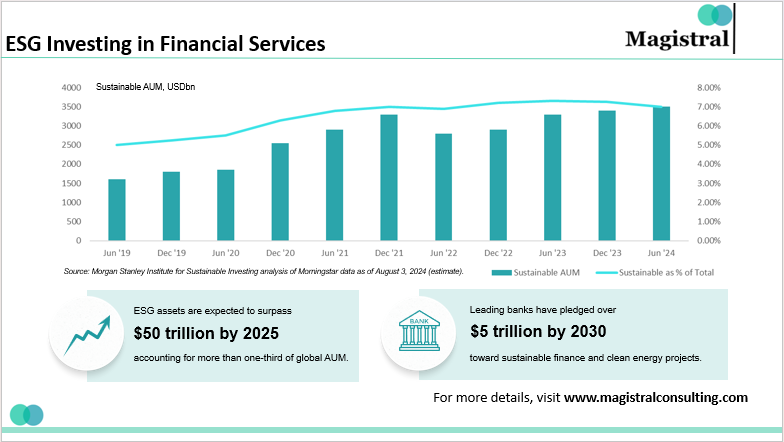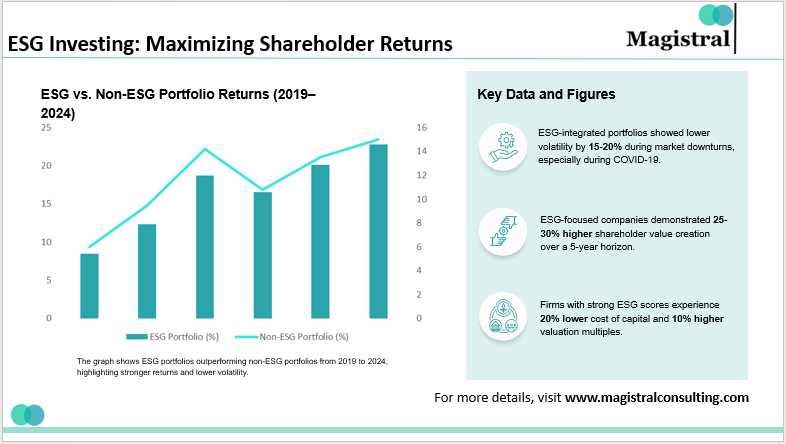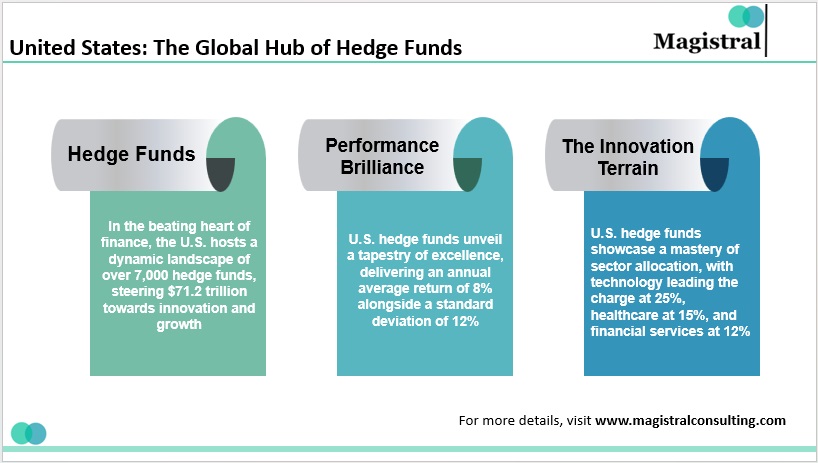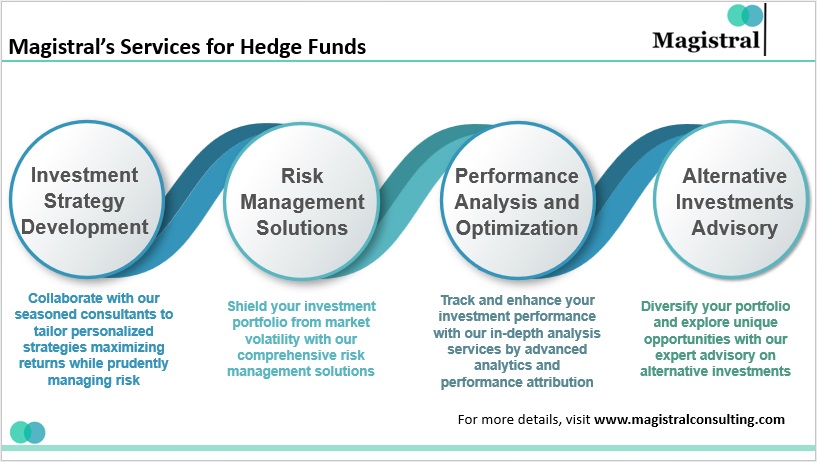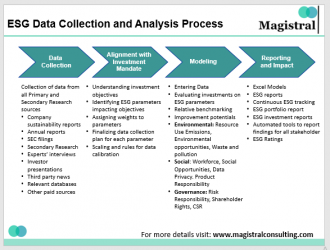Artificial intelligence is defying AI in hedge funds industry in 2025. From deep learning models in trading to proprietary data and the global race for AI investments, they use AI in hedge funds to create a competitive edge in an increasingly complex and volatile market. This article provides a full data-analytical approach to analyzing how AI in hedge funds is affecting hedge funds: with current trends, opportunities, and regional perspectives.
AI in Hedge Funds: Overview of the Market
The adoption of AI in hedge funds domain has witnessed rapid growth over the past five years. The 2024 International Data Corporation (IDC) CIO Survey reported 78% of companies said they used AI. It is as against 55% earlier than 8%. It would seem to be another layer, as it goes further in making leading firms apply AI in hedge funds. They are in every operational phase-from predictive analytics and real-time trading to risk management.
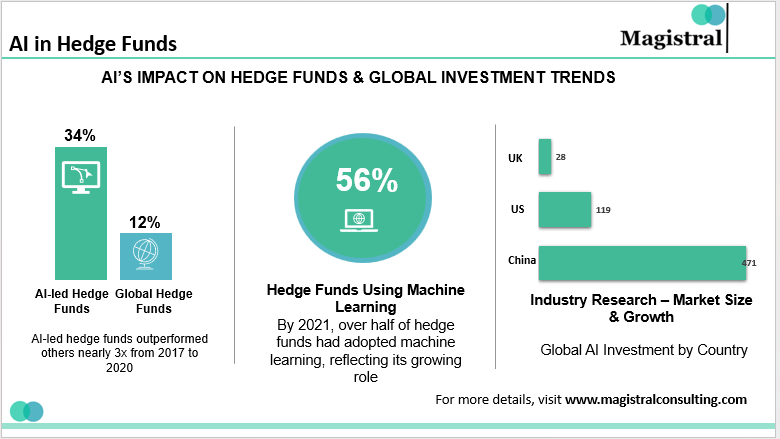
AI in Hedge Funds: Overview of the Market
Key Data Points
As compared with about 12% of returns of global hedge funds, those of the growth in AI in hedge funds produced a return of 34% between May 2017 and May 2020.
By 2021, 56% of hedge funds were already using machine learning in their trading processes, a figure that has steadily grown since then.
In the U.S., AI investment crushes its competition, raising $471 billion between 2013 and 2024, far beyond China ($119B) and the UK ($28B).
Current Adoption Trends for AI
Today’s Trends in Hedge Fund AI Adoption:
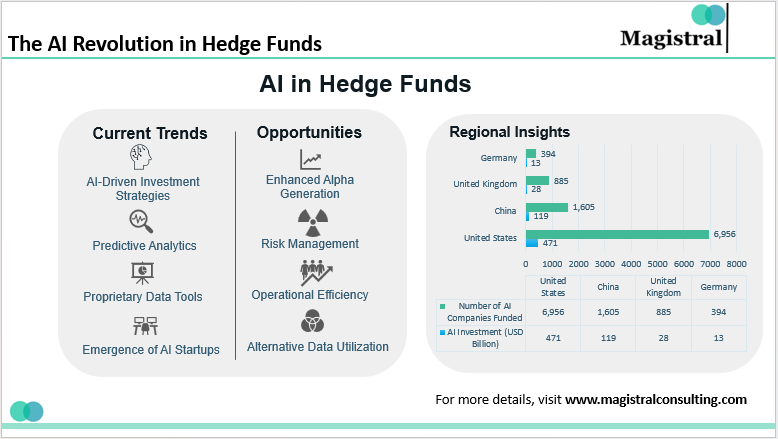
The AI Revolution in Hedge Funds
Investment Strategies Driven by AI
Hedge funds are increasingly integrating AI into their investment decision processes. Companies such as High-Flyer have implemented AI end-to-end within their trading strategy by using deep-learning models. It is for the analysis of market data and the automatic placing of trades. Ubiquity, the reputed Chinese quant fund, has set up a dedicated AI lab. It is to develop trading strategy through machine learning and big data.
Key Features:
Pattern Recognition Using AI
These systems analyze many terabytes of structured and unstructured data to develop trading signals that manual human analysts may not discern.
Algorithmic Trading
Machine learning algorithms trade at speed and volume impossible for a human, thus optimizing the trade-offs between speed and accuracy.
Sentiment Analysis
Use large language models (LLMs) for sentiment extraction with respect to markets on news and social media and policy announcements to convert qualitative data into actionable investment insights.
Predictive Analytics and Real-Time Decision Making
Through predictive analytics based on AI, hedge funds forecast markets and position assets in the best manner while trying to better analyze the risk. With real-time processing of data streams, funds can seize very short-lived opportunities and position themselves in an instant.
High-Frequency Trading (HFT)
Price exploits are sought by AI-powered HFT algorithms wherever millisecond time delays exist from one market to another.
Streaming Analytics
Prior to the competitive phase, continuous evaluation of the incoming market data streams is done so that the funds might react upon any market signal.
Complex Event Processing
AI correlates and examines events from different sources for any unusual phenomena or activities that could be significant for an investment decision.
Proprietary Data Tools and Infrastructure
Among the world’s mega hedge funds, Man Group has treated Arctic DB as a database tool of the highest caliber for the analysis of huge historical price data sets. It does not operate like a spreadsheet; rather, Arctic DB operates through code to enable fast, scalable, and integrated time-series analysis. Its adoption by Bloomberg and other giants of the financial world exemplifies the growing importance of proprietary data infrastructure in AI-driven finance.
Emergence of AI Startups and Ecosystem Growth
Startups and AI-driven approaches are progressively shaping the hedge fund world. DeepSeek, spun out from High-Flyer, is inventing large-scale AI models that can contend with global tech giants. There are implications for both tech development and financial markets. The rise of AI startups is fulfilling a role that pushes innovation and lends new tools to hedge funds. It is for data analysis, trading, and risk management.
Opportunities for AI in Hedge Funds
By leveraging AI in Hedge funds, efficiency may boost.
Enhanced Alpha Generation
Given AI’s ability to ingest and learn from gigantic datasets, hedge funds could identify interesting new alpha opportunities. For instance, BlackRock’s Systematic Equities Macro group employs LLMs to test market sentiments on securities, regions, and macroeconomic outcomes and combines these insights into quant models for more accurate alpha generation.
Risk Management and Portfolio Optimization
Predictive analytics prevails in granting funds foresight on market volatility or systemic risks, along with the ability to rebalance port dynamically for better risk similar returns.
Operational Efficiency
The automation of mundane tasks such as data cleaning, compliance-checking, and reporting can allow human analysts to concentrate on more high-value tasks, thereby improving efficiency and reducing operational costs.
Alternative Data Utilization
AI-based tools allow AI in hedge funds to extract investment insights from alternative data sources, such as satellite imagery, web traffic, and social media. This increases the opportunity set and reinforces diversification support.
Regional Insights: Global AI Investment and Hedge Fund Activity
United States
Dominance in AI Investment
The U.S. has raised nearly $500 billion in private AI investment since 2013, supporting a very healthy ecosystem of AI startups and hedge fund innovation.
Ecosystem Strength
Between 2013 and 2024, the U.S. gave funding to practically 6,956 AI companies and stands second to none for AI research and implementation into finance.
Hedge Fund Innovation
Because of their access to top-grade talent and cutting-edge research, funds based in the U.S. and using AI in trading, risk management, and client services are, to date, the most innovative.
China
Rapid Growth
China has raised $119 billion in AI investment and set up 1,605 AI companies since 2013 to establish itself as a recognized AI powerhouse.
United Kingdom and Europe
Innovation Hubs
UK ($28B AI investment, 885 new AI companies) and Germany ($13B, 394 companies) are leading European centers for AI in finance.
Asia-Pacific
Singapore, South Korea, and Japan are emerging as regional AI leaders, investing heavily in fintech and alternative data analytics for hedge funds.
Services offered by Magistral Consulting for AI in Hedge Funds
Magistral offers the following services for Hedge Funds:
AI-Powered Deal Sourcing & Market Scanning
We use natural language processing (NLP) and machine learning tools to continuously parse global data sources. It is from news feeds, filings, earnings calls, and alternative datasets-to enable hedge funds to recognize high-potential investment options in the early stages systematically.
Predictive Modeling & Quantitative Research Support
Our team builds and backrests machine learning models for price prediction, alpha generation, and other factor-based strategies. Systematic funds assist in building robust feature sets, developing trading signals, and refining model performance in preparation for real-world deployment.
Portfolio Monitoring & Risk Analytics
Based on data from the portfolio, AI is used to aggregate and analyze in such a way that any risk is detected in real time, can be planned for in different scenarios, and stress tested. Our tools can identify hidden exposures that can then be acted upon by funds to intervene in risk.
AI-Driven Sentiment Analysis & News Intelligence
Using artificial intelligence with our proprietary techniques makes it possible to stratify and identify LPs. It is based on geography, fund strategy, prior allocation behavior, or interest signals. Hence anything from outreach to engagement may get catered by personalized marketing channels. It is to give a better fundraising edge.
Operational Workflow Automation
Using AI in hedge funds and RPA tools, middle- and back-office functions are automated and streamlined. They are reconciliations, compliance reviews, trade validation, investor reporting, etc., minimizing human intervention and improving accuracy.
Alternative Data Integration & Analysis
We assist hedge funds in sourcing, cleaning, and analyzing alternative data such as web traffic, satellite images, and credit card transactions. It is through AI pipelines that convert raw inputs into investment insights.
AI-Based Fundraising & Investor Targeting
Our proprietary AI capabilities allow for the possible stratification and identification of LPs. It is based on their geography, fund strategy, prior allocation behavior, and interest signals. We might also personalize outreach and engagement across marketing channels, giving a better edge to fundraising.
Custom AI Dashboards and Visualizations
We develop interactive dashboards and visualizations that present AI-derived insights regarding portfolio performance, risk metrics, operational KPIs, and market intelligence. Integrations span Power BI and Tableau platforms.
Due Diligence Automation for Investments
We automate several aspects of due diligence processes, guided by AI data collection and screening tools. These tools analyze legal records, financial statements, ESG factors, and news to yield faster, more thorough evaluations.
About Magistral Consulting
Magistral Consulting has helped multiple funds and companies in outsourcing operations activities. It has service offerings for Private Equity, Venture Capital, Family Offices, Investment Banks, Asset Managers, Hedge Funds, Financial Consultants, Real Estate, REITs, RE funds, Corporates, and Portfolio companies. Its functional expertise is around Deal origination, Deal Execution, Due Diligence, Financial Modelling, Portfolio Management, and Equity Research
For setting up an appointment with a Magistral representative visit www.magistralconsulting.com/contact
About the Author
The article is authored by the Marketing Department of Magistral Consulting. For any business inquiries, you can reach out to prabhash.choudhary@magistralconsulting.com
What major benefits does a hedge fund reap from AI?
Generates alpha, manages risk, improves efficiencies, and analyses alternative data.
Which countries are at the front line of investments in AI in hedge funds?
The U.S.A. emerges first, followed by China, U.K., Germany, Israel, and Singapore.
What are the common AI techniques used?
Supervised learning, Unsupervised learning, Reinforcement learning, and Deep learning are wide applications of AI in hedge funds.
Are AI startups influencing hedge funds?
Yes, startups have evolved technologies that give hedge funds the trades with an advantage.
